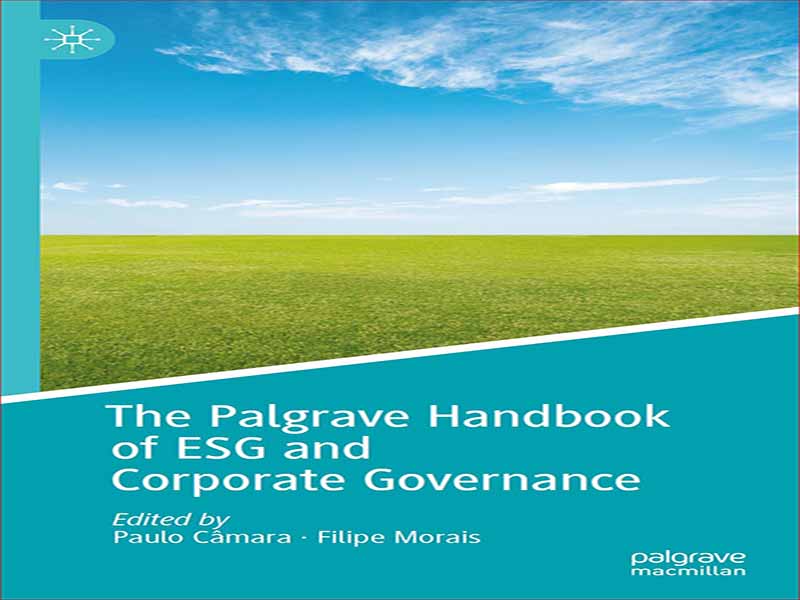- عنوان کتاب: The Palgrave Handbook of ESG and Corporate Governance
- نویسنده: Paulo Câmara
- حوزه: حاکمیت شرکتی
- سال انتشار: 2022
- تعداد صفحه: 464
- زبان اصلی: انگلیسی
- نوع فایل: pdf
- حجم فایل: 7.28 مگابایت
پایداری به سرعت در حال تبدیل شدن به جام مقدس برای دولت ها، مشاغل و جامعه است. این نشان دهنده یک تغییر اساسی در توسعه انسانی است که مسلماً مهمتر از انقلاب صنعتی است. اما بر خلاف بسیاری از انقلاب های دیگر، این بار، هیچ کس را نمی توان پشت سر گذاشت. بنابراین، این بار برای موفقیت نیازمند همکاری و همکاری (نه رقابت) بین و بین کشورهای توسعه یافته، در حال توسعه و توسعه نیافته هستیم. برخلاف انقلابهای قبلی که انگیزه آن از تمایل طبیعی بشر برای ارتقای کیفیت زندگی خود از طریق نوآوری ناشی میشد، اکنون چالش از نظر کیفی متفاوت است. این در مورد بقای نوع بشر است – به عبارت دیگر، ما با یک تهدید جمعی روبرو هستیم و بنابراین باید با هم تغییر کنیم. این یک شرایط نسبتاً منحصر به فرد است که منفعت شخصی و خیر عمومی در چنین مقیاس جهانی همسو هستند. در حالی که همه انواع سازمانها نقش مهمی را ایفا میکنند، دولتها و شرکتها اهمیت ویژهای در پاسخگویی موفق به این چالش بیسابقه دارند. دولتها ملزم به ایجاد یک چارچوب قانونی و نظارتی مؤثر هستند که سرمایهگذاری و نوآوری همسو با الزامات پایداری و حذف تدریجی سرمایهگذاریهایی را که برای پیگیری دستور کار پایداری مضر هستند، تشویق کند – و حتی اجباری کند. علاوه بر این، دولت ها باید الگو قرار دهند و اصول محیطی، اجتماعی و حکمرانی (ESG) را به عنوان سنگ بنای دستورالعمل های سیاست عمومی اتخاذ کنند. اما تلاش برای پایداری تا کنون به شدت ناقص بوده است. COP26 اخیر توسط آنتونیو گوترش، دبیر کل سازمان ملل متحد، ناامیدکننده و بازتابی از “منافع، تضادها، و وضعیت اراده سیاسی در جهان امروز” نامگذاری شد. تغییر لحظه آخری در پیمان گلاسکو توسط چین و هند برای نرم کردن زبان در مورد انرژی زغال سنگ، با ناامیدی عمیق روبرو شد و این نمادی غم انگیز است که هنوز در سطح سیاسی جهانی چقدر باید انجام شود. کشورها همچنین باید تلاش های مداومی را برای دستیابی به راه حل های بین المللی یکسان، به ویژه در مسائل فوری مانند تغییرات آب و هوا، به کار گیرند. در اتحادیه اروپا، پیشرفت هایی حاصل شده است، اما بدون بحث و جدل شدید نیست. به عنوان مثال، تهیه مقررات طبقه بندی اتحادیه اروپا و مقررات تفویض شده مربوطه به آن – ابزاری اساسی برای گذار اروپا به اقتصاد سبز – مورد بحث و لابی شدید کشورهای عضو اتحادیه اروپا قرار گرفته است و نتیجه نهایی این بسته قانونی خواهد بود. احتمالاً با اتفاق نظر کارشناسان و صنایع آب و هوا مواجه نمی شود. به طور مشابه، سند مشاوره 2020 ارائه شده توسط کمیسیون اروپا در رابطه با حاکمیت شرکتی پایدار با انتقاد شدید از نظر روش شناسی زیربنای ابتکار مواجه شد، که پیش بینی تقسیم بیشتر در مراحل بعدی روند قانون گذاری را دارد. این تنش ها و فشارها در سطوح سیاسی و نظارتی با روایتی که امروزه پیرامون جنبش سرمایه گذاری مسئول، به ویژه ESG (محیط زیست، اجتماعی و حکومت) وجود دارد، در تضاد است. در حالی که در بالاترین سطح توسعه سیاست بینالملل ناهموار است، جنبش ESG به سرعت در حال گسترش است و مدعی پیشرفت قابل توجهی است. این در حالی است که تمرکز بسیار بر افشای ESG است تا اصلاحات مهم شرکتی، و مسائل مهمی در ارزیابی اهمیت و مقایسه در گزارشهای ESG و ارائه دهندگان رتبهبندی وجود دارد. از سوی دیگر، مسائل زیستمحیطی همچنان در سرلوحه توجه شرکتها قرار دارد و علیرغم برخی پیشرفتها در مورد دستورالعمل پیشنهادی در مورد بررسی دقیق شرکتی و مسئولیتپذیری شرکتی، جنبههای مرتبط مانند حقوق بشر یا طبقهبندی اجتماعی به وضوح از روشهای ESG عقبتر هستند و مناظره.
Sustainability is quickly becoming the Holy Grail for governments, businesses, and society. It represents a fundamental shift in human development arguably more significant than the industrial revolution. But unlike many other revolutions, this time, no one can be left behind. Therefore, this time we require collaboration and cooperation (not competition) among and between developed, developing, and under-developed countries if we are to succeed. Unlike previous revolutions where the impetus came from mankind natural desire to enhance their quality of life through innovation, the challenge is now qualitatively different. It is about the very survival of mankind—in other words, we are facing a collective threat and we must therefore change together. It is a rather unique circumstance that self-interest and common good are aligned in such a global scale. While all types of organizations have an important role to play, governments and companies have special relevance in enabling a successful response to this unprecedented challenge. Governments are required to create an effective legal and regulatory framework that encourages—and even mandates—investment and innovation aligned with the sustainability imperative, and the phasing out of investments that are harmful to the pursuit of the sustainability agenda. Moreover, states are to set the example and to adopt Environment, Social and Governance (ESG) principles as cornerstones of public policy guidelines. But the quest for sustainability has thus far been grossly incomplete. The recent COP26 was labeled by the UN Secretary-General, Antonio Guterres, as disappointing and a reflection of “the interests, the contradictions, and the state of political will in the world today”. The last-minute change to the Glasgow pact by China and India to soften language on coal power, was met with deep disappointment and it is a sad icon of how much is still to be done at political global level. States must also deploy consistent efforts to achieve uniform international solutions, namely in urgent issues such as climate change. In the EU, some progress has been made but not without intense controversy. As an example, the preparation of the EU Taxonomy Regulation and its respective delegated regulations—a fundamental instrument for European transition to a green economy—has been subject to intense discussion and lobbying by EU-member states and the end result of this legislative package will likely not meet unanimity from climate experts and industries. Similarly, the 2020 Consultation document presented by the European Commission in respect to sustainable corporate governance faced fierce criticism in terms of the methodology underlying the initiative, which anticipates further division in subsequent steps of the legislative process. These tensions and pressures at the political and regulatory levels contrast with the narrative that is today present around the responsible investment movement, especially ESG (Environmental, Social and Governance). While at the highest level of international policy development is patchy, the ESG movement is quickly expanding and claims significantly more progress. This is despite the focus being placed very much on ESG disclosure than on significant corporate reforms, and there remaining significant issues on materiality assessment and comparability across ESG reports and rating providers. On the other hand, environmental issues remain at the front of corporate attention and, in spite of some advances on a proposed Directive on corporate due diligence and corporate accountability, relevant aspects such as human rights or a social taxonomy clearly lag behind the ESG methodologies and debate.
این کتاب را میتوانید از لینک زیر بصورت رایگان دانلود کنید:
Download: The Palgrave Handbook of ESG and Corporate Governance




































نظرات کاربران